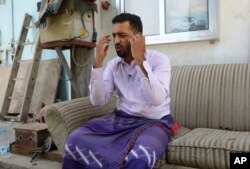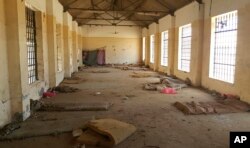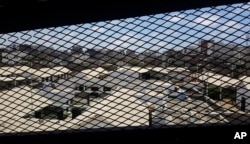Two senior U.S. senators are asking Defense Secretary Jim Mattis to investigate reports that U.S. military interrogators worked with forces from the United Arab Emirates accused of torturing detainees in Yemen.
Arizona Senator John McCain, the Republican chairman of the Senate Armed Services Committee, and the ranking Democrat, Jack Reed of Rhode Island, called the reports "deeply disturbing."
The reports were revealed in an investigation by The Associated Press published Thursday.
That same day, McCain and Reed wrote a letter to the defense secretary asking him to immediately review the reported abuse and what U.S. forces knew.
"Even the suggestion that the United States tolerates torture by our foreign partners compromises our national security mission by undermining the moral principles that distinguish us from our enemies — our belief that all people possess basic human rights," the senators wrote Mattis. "We are confident that you find these allegations as extremely troubling as we do."
The AP's report detailed a network of secret prisons across southern Yemen where hundreds are detained in the hunt for al-Qaida militants and held without charges. American defense officials confirmed to the AP that U.S. forces have interrogated some detainees in Yemen but denied any participation in, or knowledge of, human rights abuses.
Defense officials told the AP that the department had looked into reports of torture and concluded that its personnel were not involved. The American officials confirmed that the U.S. provides questions to the Emiratis and receives transcripts of their interrogations.
The 18 lockups are run by the UAE and by Yemeni forces it created, according to accounts from former detainees, families of prisoners, civil rights lawyers and Yemeni military officials. At the Riyan airport in the southern Yemeni city of Mukalla, former inmates described shipping containers smeared with feces and crammed with blindfolded detainees. They said they were beaten, roasted alive on a spit and sexually assaulted, among other abuses. One witness, who is a member of a Yemeni security force, said American forces were at times only yards (meters) away.
The UAE Ministry of Foreign Affairs said in a statement Friday that the allegations are "completely untrue" and a "political game" by Yemeni militias to discredit a Saudi-led coalition that includes the UAE. It says it does not run or oversee any prisons in Yemen, and that any such facilities are under "the jurisdiction of the Yemeni legitimate authorities."
Most of the clandestine sites are run by either the Hadramawt Elite or Security Belt, Yemeni forces that were created, trained and financed by the UAE. Officially, they are under the authority of Yemen's internationally recognized government, but multiple Yemeni government officials told the AP they have no control over them and they answer to the Emirates.
At least five of the prisons are located in coalition bases and directly run by the Emirates, according to four senior Yemeni government and military officials, former detainees and families of prisoners.
At Riyan airport prison, six former detainees described hundreds of prisoners held in shipping containers at the site and gave extensive accounts of abuses, saying the officers in charge and conducting interrogations were Emiratis. Families held frequent protests outside Riyan seeking news about loved ones imprisoned there. Several relatives of prisoners told the AP that they spoke repeatedly with the Emirati officer in charge of the site, who identified himself only by a pseudonym, Abu Ahmed, trying to secure their relatives' release.
The UAE is among the critical allies that the U.S. relies on in the fight against al-Qaida. The U.S. views the militants' branch in Yemen as a direct terrorist threat to Americans.
"We request that you direct an immediate review of the facts and circumstances related to these alleged abuses, including U.S. support to the Emirati and Yemeni partner forces that were purportedly involved," the lawmakers wrote. "We also request that you conduct a thorough assessment of what, if anything, U.S. forces knew about these alleged abuses or subsequently learned about them."
McCain, a Navy pilot during the Vietnam War, was captured after his plane was shot down in 1967. He was imprisoned for more than 5½ years and tortured repeatedly before he was released in 1973. In the Senate, McCain has criticized harsh treatment of terror suspects by the CIA at "black site" prisons and was a key sponsor of the 2005 Detainee Treatment Act prohibiting inhumane treatment of prisoners.
The lawmakers requested a Defense Department briefing on its findings as soon as possible.












